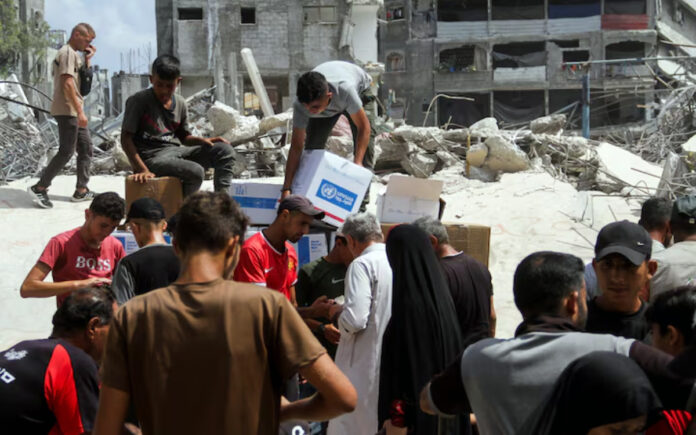New York: The United States will assess Israel’s progress in addressing the humanitarian crisis in Gaza this week, determining how Washington might respond, according to National Security Adviser Jake Sullivan. Speaking on CBS’s Face the Nation on Sunday, Sullivan emphasized that judgments will be made about Israel’s efforts toward humanitarian relief, in line with an Oct. 13 letter from President Joe Biden’s administration. The letter, signed by Secretary of State Antony Blinken and Defense Secretary Lloyd Austin, outlined a series of actions Israel must take within 30 days to maintain continued U.S. military support.
“This week we will make our judgments about what kind of progress they have made,” Sullivan said. “And then Secretary Austin, Secretary Blinken, the president will make judgments about what we do in response, and I’m not going to get ahead of that.”
In a recent report, COGAT, the Israeli agency handling Palestinian civilian affairs, listed its humanitarian activities over the past six months, emphasizing efforts to provide relief amid the approaching winter. “Through expanded routes, medical assistance, infrastructure improvements and coordination with international partners, COGAT continues to facilitate the implementation of humanitarian efforts that are meant to help the civilian population in the Gaza Strip,” the agency stated.
The U.S. deadline comes just after global food security experts issued a stark warning, noting a high risk of famine in northern Gaza as Israel intensifies its military operations against Hamas forces. The United States has stressed that it is monitoring the situation to ensure Israel’s actions do not reflect a “policy of starvation” in Gaza.
Also Read | IMF Agrees to $185.5 Million Disbursement for Zambia Pending Final Approval
In response to warnings of famine, COGAT disputed claims by the Famine Review Committee, an independent body using the Integrated Food Security Phase Classification. The agency asserted that “all projections by the IPC have proven incorrect and inconsistent with the situation on the ground,” affirming Israel’s commitment to international law in facilitating aid to Gaza. COGAT also announced plans to open an additional crossing at Kissufim to streamline aid delivery.
Amid these developments, U.N. data shows a significant reduction in aid reaching Gaza, with accusations that Israel has obstructed aid flows to northern Gaza. U.N. Palestinian relief agency head Philippe Lazzarini recently criticized Israel’s approach, asserting that Gaza residents are deprived of essentials. “This deprives people in Gaza of the basics including food to survive,” Lazzarini posted on social media. He noted that only around 30 trucks of aid have entered Gaza per day—approximately 6% of the daily needs.
Also Read | Rethinking AI: OpenAI and Others Pursue New Path Beyond ‘Bigger is Better’
Israeli U.N. Ambassador Danny Danon countered, stating that more than a million tons of aid had been delivered over the past year, attributing shortages to alleged aid diversion by Hamas. Hamas has denied these accusations, placing blame on Israel for the existing shortages.



